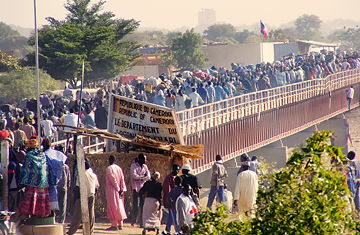
People fleeing the Chadian capital N'Djamena cross the bridge on the Chad and Cameroon border in Kousseri on February 4, 2008.
French President Nicolas Sarkozy likes to adopt a Travis Bickle "you-talkin-to-me?" swagger when seeking to intimidate political rivals, protesters and the French media. But it remains to be seen whether Sarkozy's snarl will prompt a retreat by hardened rebel fighters in Chad. Amid a lull in the battle for control of the Chadian capital of N'Djamena on Tuesday, Sarkozy responded to rebel threats of renewed violence by warning, "If France must do its duty, it will — let no one doubt that."
The rebels had earlier said they would accept a cease-fire if President Idriss Déby , a longtime ally of France (and lately, also of the U.S.), left office and cleared the way for their takeover. "You take power through elections, not otherwise," Sarkozy warned, indicating that the 1,400 French troops stationed in Chad could step off the sidelines if the rebels push their luck. The United Nations Security Council has urged all member states to back President Déby's government in the face of the rebel onslaught. "If Chad has been the victim of an aggression," Sarkozy added, "France would have — that's conditional — the means to oppose that action... Everyone had better think about that."
The standoff in N'Djamena, however, represents something of a dilemma for the international community, especially so in France, whose new government has expressed a desire to move away from a long and notorious policy of propping up friendly despots. Déby's regime has been widely accused of corruption and a violent authoritarianism, and human rights campaigners have reported that the regime has used the rebel attack as a pretext to round up leaders of the political opposition. But Déby is also an important regional ally in the U.S. "war on terror," and his cooperation is essential to the objective of deploying European peacekeeping forces in Darfur. In fact, the rebels forces seeking to oust Déby entered Chad from Sudan, and are widely seen as a proxy force for the Sudanese government, which has openly supported their attempt to oust Déby. The timing of the rebel assault is also widely seen as an attempt to frustrate international efforts to intervene in Darfur.
Hence the Déby dilemma: Prop up an odious but friendly regime, or allow Sudan, via its proxies, to sabotage efforts to stop the killing in Darfur.
In the initial hours and days of the rebel push into N'Djamena, Paris remained in close phone contact with Déby — at one point offering him asylum in France. But French public statements about the conflict were confined to assurances that French troops in Chad were involved only in protecting foreign civilians and evacuating expatriates, and that bilateral security accords between the two countries did not require France to intervene to save an embattled regime.
Rebel forces, however, accused the French airlift of expatriates of providing cover for Chadian army attack helicopters operating out of the same base. By firing rockets at rebel formations, those helicopters allowed Déby loyalists to drive insurgent troops to the outskirts of N'Djamena on Monday. Regrouping outside the capital, rebel leaders began blaming the hundreds of dead and wounded civilians discovered in their wake by aid groups on alleged bombing raids by French warplanes on insurgent positions. France flatly denied those charges, and insisted that French troops had confined themselves to protecting foreign nationals.
But France's hands-off position may be about to change. The speed and ferocity of the initial rebel onslaught on the capital may have led Paris to consider Déby's fall imminent, and defense of his regime futile. But the rally by his forces Monday appears to have changed Sarkozy's calculations. On Monday, the U.N. Security Council adopted a resolution that "strongly condemns these attacks and all attempts at destabilization by force," but fell short of approving outside military intervention after Russia objected. Still, Sarkozy used that vote as a basis for his warning to rebels on Tuesday. Though France would clearly need U.N. approval to intervene, Sarkozy suggests that Monday's vote made such clearance only logical should the rebels launch a new assault on N'Djamena. "The French Army isn't there to confront anyone with arms, but now a unanimous legal decision has been made by the Security Council," Sarkozy said, indicating his belief that the U.N. would favor its enforcement if defied.
Still, intervening would undercut Sarkozy's efforts to move France beyond Françafrique, its half-century old policy of intervening in former colonies to prop up friendly dictators. Sarkozy had made it clear he wants to end such arrangements and favor greater democracy, events in Chad have left no good option. "I didn't want direct intervention before a precise legal framework" had been outlined, Sarkozy said Tuesday, insisting that the U.N. vote changed the equation. "We're no longer in what was called Françafrique. There are international rules, and I want to conform to them."
